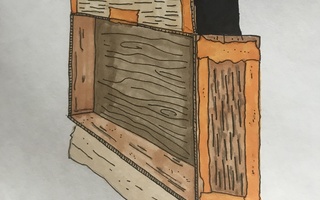Compartmentalization kept me sane, or so I thought. When faced with a wave of seemingly insurmountable tasks, I have always divided life’s various challenges into small, digestible categories. Likewise, my schedule revolves around a system of time units, with each unit consisting of 30 minutes. Through this unit system, I track the amount of time dedicated to a specific activity and determine whether the returns from that activity match the investment.
For better or worse, the Army reinforced my quest to categorize all aspects of my life. Now I instinctively roll my t-shirts and socks, insert items into my backpack based on their weight and utility, and regularly rely on acronyms when speaking. Military time dominates my watch, computer, and agenda. My ears and scalp have learned to love the wind’s sweet embrace, prompting me to keep my hair well regulated (a far cry from my hippie high school days).
Harvard’s atmosphere only heightened my desire to classify everything and everyone based on their alleged utility and cost in terms of time units. Unfortunately, this tendency to categorize objects has extended beyond the inanimate world. My extracurricular life soon became an extension of my professional life. Time spent with friends and family, which I once held holy, also transformed into a series of calculations involving returns and investments.
Even meals weren’t exempt from being treated like appointments. Despite the frequency with which students state “Let’s catch a meal,” I’ve always found the phrase particularly unnerving. I, like anyone else, enjoy eating. However, the aforementioned statement always seems robotic, converting meals—a refuge from school—into yet another series of mandatory meetings.
However, unlike inanimate t-shirts or socks, humans typically notice when someone they love has begun to schedule their conversations like you would a dentist appointment. My relationships with others quickly devolved into a system of lifeless transactions. Rather than aid me, my schedule consumed my life. I lived to serve my agenda; I had become nothing more than the sum of my routines.
People aren’t objects you can stuff in your rucksack based on convenience; they require your individual attention. More importantly, cold professionalism only begets cold professionalism. The few days I spent at home this summer were a rude awakening; I came to the realization that my family, whom I supposedly strove to protect, felt as if I had intentionally distanced myself from them. I had finally succeeded in segmenting my entire life into a string of lifeless appointments.
This isn’t a condemnation of time management, nor am I condoning a spontaneous approach to all parts of life. Meticulous planning remains key to victory over life’s most difficult endeavors. Furthermore, just as people notice mechanical routines, individuals can easily distinguish when one takes an overly nonchalant, impromptu approach to life’s challenges. But these words serve as a warning; either extreme on the planning continuum can spell disaster for one’s relationships with others, as well as one’s mental health.
I don’t plan on abandoning my time unit system, nor do I intend to suppress my love for utility, rolled up t-shirts, or starting every morning with the ideal ratio of Cracklin’ Oat Bran and nonfat milk (for those of you that are curious, it’s 1.5:1). However, I hope to embrace more spontaneity during this coming semester. After all, the Army’s already sectioned off a significant chunk of my life; I might as well use my occasional free time to engage in a shenanigan or two (of the legal variety, of course). Hell, maybe I’ll even give another brand of cereal a chance.
More importantly, I hope others learn to embrace uncertainty. It’s alright to not know what you’re doing next summer. It’s perfectly fine to start October feeling just as confused as you were when you started school in August. Organize the occasional misadventure. Make a fool of yourself, and allow a bit of chaos to seep into your schedule.
Nathan L. Williams ’18, a current Army ROTC cadet, is a government concentrator in Mather House. His column appears on alternate Wednesdays.
The views expressed in this article are those of the author and do not reflect the official position of Harvard’s ROTC program, the Department of the Army, Department of Defense, or the U.S. Government.
Read more in Opinion
Letter to the Editor: In Defense of European StudiesRecommended Articles
-
Books & BulletsThe expectations cadets encounter are what make the transition between school and ROTC both humorous and difficult.
-
The American ExperienceUltimately, I’m not afraid of any one organization making a robot of me.
-
Pleasantly GrimBut amongst close friends, self-deprecating, cynical, dark humor—the language of the morbidly joyful—provides the perfect disruption.
-
The Human Face of Institutional ChangeIn an odd sense, our campus culture is right; each of us is a leader in our own, humble capacity.
-
 Fictitious Alternatives
Fictitious Alternatives













